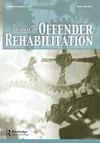The experiences of older formerly incarcerated adults in a specialized reentry program during the COVID-19 pandemic
IF 1.1
Q3 SOCIAL WORK
引用次数: 2
Abstract
Abstract A growing area of concern among prison reform advocates and human rights activists is the “greying prison population” or the continuous, unified growth in the number of older incarcerated individuals. Older individuals experience an accelerated aging process while incarcerated, but are less likely to reoffend upon release. While the aging prison population has in recent years become a focus of criminological and gerontological scholars, the lived experience of older formerly incarcerated individuals during the reentry process remains understudied. Using a qualitative approach, this cohort study seeks to further elucidate the unique needs, beliefs, and perceptions of this population within the context of an unprecedented public health crisis, the COVID-19 pandemic. A series of interviews was conducted with participants in a comprehensive reentry program for formerly incarcerated older adults in New York City who had been released between 2019 and 2020. Participants (n = 9) reported that their greatest challenges during the reentry process were securing safe and stable housing, managing physical and mental health issues, and coping with trauma, social isolation, and interpersonal conflicts. Other criminogenic factors which are typically associated with recidivism were less frequently reported among the cohort, including challenges securing employment and substance abuse issues.新冠肺炎大流行期间,曾被监禁的老年人在专门重返社会计划中的经历
摘要监狱改革倡导者和人权活动家越来越关注的一个领域是“监狱人口的老龄化”,即被监禁的老年人数量的持续统一增长。老年人在被监禁期间会经历加速的衰老过程,但获释后再犯的可能性较小。尽管近年来监狱人口老龄化已成为犯罪学和老年病学学者关注的焦点,但以前被监禁的老年人在重返社会过程中的生活经历仍然研究不足。这项队列研究采用定性方法,试图在前所未有的公共卫生危机新冠肺炎大流行的背景下,进一步阐明这一人群的独特需求、信仰和看法。对2019年至2020年间获释的纽约市以前被监禁的老年人的全面重返社会计划的参与者进行了一系列采访。参与者(n = 9) 报告称,他们在重返社会过程中面临的最大挑战是确保安全稳定的住房,管理身心健康问题,以及应对创伤、社会孤立和人际冲突。其他通常与累犯有关的犯罪因素在队列中的报告频率较低,包括就业挑战和药物滥用问题。
本文章由计算机程序翻译,如有差异,请以英文原文为准。
求助全文
约1分钟内获得全文
求助全文
来源期刊

Journal of Offender Rehabilitation
SOCIAL WORK-
CiteScore
1.60
自引率
0.00%
发文量
24
期刊介绍:
The Journal of Offender Rehabilitation is a multidisciplinary journal of innovation in research, services and programs in criminal justice and corrections. The journal is an essential professional resource for practitioners, educators and researchers who work with individuals involved in the criminal justice system and study the dynamics of rehabilitation and individual and system change. Original research using qualitative or quantitative methodology, theoretical discussions, evaluations of program outcomes, and state of the science reviews will be considered.
 求助内容:
求助内容: 应助结果提醒方式:
应助结果提醒方式:


